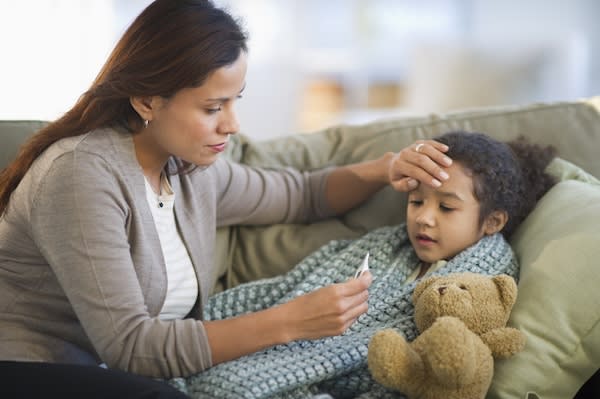
Para leer este artículo, haga clic aquí.
[5 MIN READ]
In this article:
-
Cough, rash and diarrhea are some of the most common reasons parents take their children to the emergency room (ER) when it’s not necessary. Here, we show you how to determine if it’s actually an emergency.
-
Most coughs can be treated by your child’s primary care provider or at urgent care. Only go to the ER if they have trouble breathing or are becoming dehydrated.
-
You can treat most rashes and cases of diarrhea at home. Go to urgent care if your child is showing other symptoms, and head to the ER if those symptoms are life-threatening.
Skip the ER wait: Where to take kids for cough, rash and diarrhea
It’s tough to be a parent. Your child needs you to make it all better when they’re sick, but sometimes, you’re not sure how to do that.
That’s OK — we’re here to help. Cough, rash and diarrhea are three of the most common reasons parents take kids to the emergency room (ER) when they don’t have to. We talked to Jason Ho, M.D., a Providence urgent care specialist who sees patients in Los Angeles, California, about where you should seek care for these three ailments. Read on to learn more.
Understanding where to seek care: Save time, money and stress
There are many reasons why going to the ER when it’s not truly an emergency can be a bad idea, including:
- It takes a lot of time (the entire visit may take several hours, depending on wait times)
- Emergency care is expensive (even if your insurance company covers most of the cost, you still are likely responsible for a co-payment or deductible)
- It’s stressful (the atmosphere of an ER can be even more frightening for a child than urgent care or their doctor’s office)
Of course, you should absolutely visit the ER if your child has a life-threatening illness or injury, or if they are in extreme pain or distress. Otherwise, urgent care is the way to go — especially for coughs, rashes and diarrhea.
When your child has a cough
When your child has a bad cough, it’s usually appropriate to just take them to an urgent care facility, says Dr. Ho.
“If the cough is accompanied by signs of respiratory distress or dehydration,” he says, “then it’s probably best to go to the ER. Otherwise, an urgent care provider can start an evaluation.”
At home, Dr. Ho says, you can start treatment with a teaspoon of honey, humidifiers and fluids. “If it looks like a typical cold, then your job is mostly providing supportive care,” he says. “Children over 12 years old can try over-the-counter cough and cold medications. If your child has allergies, you can try an antihistamine, and if they are asthmatic, then you should start asthma medications.” Honey should not be given to children younger than age 1.
When your child has a rash
Urgent care or your child’s doctor is almost always the right choice for a rash, says Dr. Ho, except when the child appears to be experiencing toxic symptoms.
Some examples of those “toxic symptoms” include:
- The child has difficulty breathing or swallowing — it could indicate they are experiencing anaphylaxis because of a severe allergic reaction.
- The rash is associated with a head injury
- The child has swelling of the face, lips or tongue — another sign of a severe allergic reaction
- The rash is accompanied by a high fever
Home treatment for the rash depends on your child’s symptoms, says Dr. Ho. “If it’s itchy or appears like a mild allergic reaction,” he says, “then you can try over-the-counter cortisone cream and an oral antihistamine. Be sure to watch out for any potential new exposures or triggers.”
When your child has diarrhea
“Diarrhea is often a stomach virus, other infection or a food intolerance,” says Dr. Ho. “If it is mild, then you should just keep your child hydrated. However, if the symptoms are more serious, such as high fever, blood in the stool or signs of dehydration, then the child should be evaluated.”
Even then, however, an urgent care clinic is usually the best option for quick treatment. The only time you would need to bring them to the emergency room, Dr. Ho says, is when they appear to be toxic — such as by exhibiting severe dehydration, lethargy and vomiting.
The importance of having a primary care provider
When your child gets sick, one of the most important ways you can help them is by establishing a primary care provider. They can keep records on your child’s growth and development, and they may be able to spot when something is off.
If a child is sick or injured, the pediatric primary care provider is the first point of contact and can make referrals as necessary. They can effectively manage many childhood illnesses, including coughs, rashes and diarrhea, as well as runny noses and sore throats.
Financial assistance and low-cost clinics
At Providence, we support everyone who comes to us for care, regardless of coverage or ability to pay. We recognize that many people in our community either don't have health insurance or those with insurance may have high out-of-pocket costs.
Either way, you shouldn’t have to delay care due to financial concerns. Roughly three out of four people who apply for financial assistance receive support.
In addition to treating patients with both Medicare and Medicaid, Providence also provides low-cost clinics through the Health Resources and Services Administration.
These clinics, located throughout the Providence service area, can help you access primary care services at a much lower cost than you would normally pay. Our goal is to help patients establish a relationship with a primary care provider without having to break the bank.
Learn more about where to go for appropriate care
You can learn more about medical emergencies and when you should use your primary care provider, urgent care and the emergency department on Providence’s Appropriate Care web page.
Contributing caregiver

Jason Ho, M.D., is a Providence urgent care specialist who sees patients in Los Angeles, California.
Find a doctor
If you are looking for a primary care provider, you can find one who’s right for you in our provider directory. Through Providence Express Care Virtual, you can access a full range of health care services.
Download the Providence app
It’s all in the app: easily stay connected with Providence and your health. With the Providence app, you can schedule appointments, have virtual visits from the comfort of your home, get personalized health recommendations, access your health records and so much more. Learn more and download the app.
Related resources
Why your child’s pediatrician is so important during puberty
Understanding measles: What you need to know
A complete guide to strep throat infection
This information is not intended as a substitute for professional medical care. Always follow your health care professional’s instructions.
About the Author
More Content by Providence Health Team




















